INFINITI Q50 2020 Warranty Information Booklet
Manufacturer: INFINITI, Model Year: 2020, Model line: Q50, Model: INFINITI Q50 2020Pages: 64, PDF Size: 0.28 MB
Page 31 of 64
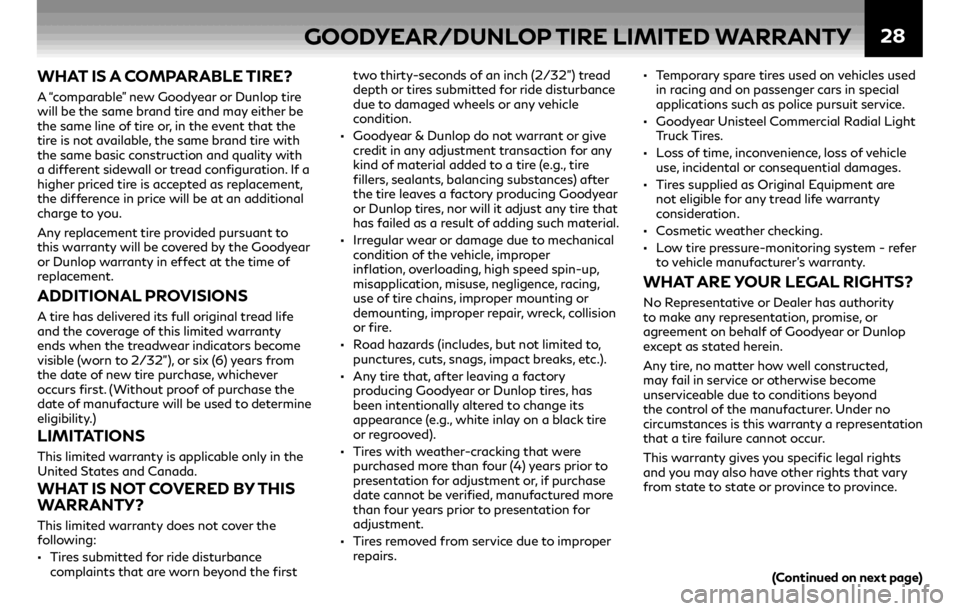
28
WHAT IS A COMPARABLE TIRE?
A “comparable” new Goodyear or Dunlop tire
will be the same brand tire and may either be
the same line of tire or, in the event that the
tire is not available, the same brand tire with
the same basic construction and quality with
a different sidewall or tread configuration. If a
higher priced tire is accepted as replacement,
the difference in price will be at an additional
charge to you.
Any replacement tire provided pursuant to
this warranty will be covered by the Goodyear
or Dunlop warranty in effect at the time of
replacement.
ADDITIONAL PROVISIONS
A tire has delivered its full original tread life
and the coverage of this limited warranty
ends when the treadwear indicators become
visible (worn to 2/32”), or six (6) years from
the date of new tire purchase, whichever
occurs first. (Without proof of purchase the
date of manufacture will be used to determine
eligibility.)
LIMITATIONS
This limited warranty is applicable only in the
United States and Canada.
WHAT IS NOT COVERED BY THIS
WARRANTY?
This limited warranty does not cover the
following:
•• Tires submitted for ride disturbance
complaints that are worn beyond the first two thirty-seconds of an inch (2/32”) tread
depth or tires submitted for ride disturbance
due to damaged wheels or any vehicle
condition.
•• Goodyear & Dunlop do not warrant or give
credit in any adjustment transaction for any
kind of material added to a tire (e.g., tire
fillers, sealants, balancing substances) after
the tire leaves a factory producing Goodyear
or Dunlop tires, nor will it adjust any tire that
has failed as a result of adding such material.
•• Irregular wear or damage due to mechanical
condition of the vehicle, improper
inflation, overloading, high speed spin-up,
misapplication, misuse, negligence, racing,
use of tire chains, improper mounting or
demounting, improper repair, wreck, collision
or fire.
•• Road hazards (includes, but not limited to,
punctures, cuts, snags, impact breaks, etc.).
•• Any tire that, after leaving a factory
producing Goodyear or Dunlop tires, has
been intentionally altered to change its
appearance (e.g., white inlay on a black tire
or regrooved).
•• Tires with weather-cracking that were
purchased more than four (4) years prior to
presentation for adjustment or, if purchase
date cannot be verified, manufactured more
than four years prior to presentation for
adjustment.
•• Tires removed from service due to improper
repairs.
•• Temporary spare tires used on vehicles used
in racing and on passenger cars in special
applications such as police pursuit service.
•• Goodyear Unisteel Commercial Radial Light
Truck Tires.
•• Loss of time, inconvenience, loss of vehicle
use, incidental or consequential damages.
•• Tires supplied as Original Equipment are
not eligible for any tread life warranty
consideration.
•• Cosmetic weather checking.
•• Low tire pressure-monitoring system - refer
to vehicle manufacturer’s warranty.
WHAT ARE YOUR LEGAL RIGHTS?
No Representative or Dealer has authority
to make any representation, promise, or
agreement on behalf of Goodyear or Dunlop
except as stated herein.
Any tire, no matter how well constructed,
may fail in service or otherwise become
unserviceable due to conditions beyond
the control of the manufacturer. Under no
circumstances is this warranty a representation
that a tire failure cannot occur.
This warranty gives you specific legal rights
and you may also have other rights that vary
from state to state or province to province.
GOODYEAR/DUNLOP TIRE LIMITED WARRANTY
(Continued on next page)
Page 32 of 64
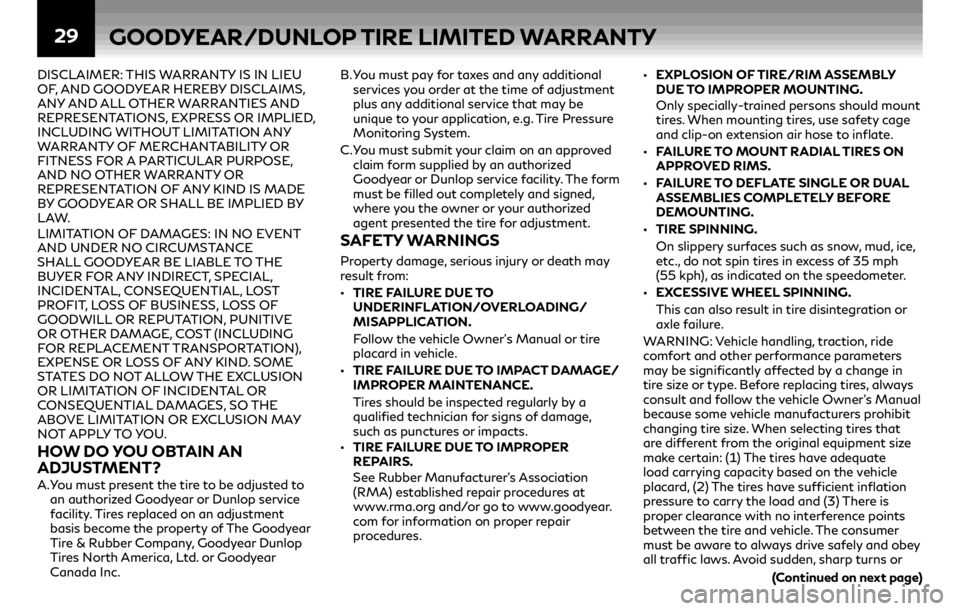
29
DISCLAIMER: THIS WARRANTY IS IN LIEU
OF, AND GOODYEAR HEREBY DISCLAIMS,
ANY AND ALL OTHER WARRANTIES AND
REPRESENTATIONS, EXPRESS OR IMPLIED,
INCLUDING WITHOUT LIMITATION ANY
WARRANTY OF MERCHANTABILITY OR
FITNESS FOR A PARTICULAR PURPOSE,
AND NO OTHER WARRANTY OR
REPRESENTATION OF ANY KIND IS MADE
BY GOODYEAR OR SHALL BE IMPLIED BY
LAW.
LIMITATION OF DAMAGES: IN NO EVENT
AND UNDER NO CIRCUMSTANCE
SHALL GOODYEAR BE LIABLE TO THE
BUYER FOR ANY INDIRECT, SPECIAL,
INCIDENTAL, CONSEQUENTIAL, LOST
PROFIT, LOSS OF BUSINESS, LOSS OF
GOODWILL OR REPUTATION, PUNITIVE
OR OTHER DAMAGE, COST (INCLUDING
FOR REPLACEMENT TRANSPORTATION),
EXPENSE OR LOSS OF ANY KIND. SOME
STATES DO NOT ALLOW THE EXCLUSION
OR LIMITATION OF INCIDENTAL OR
CONSEQUENTIAL DAMAGES, SO THE
ABOVE LIMITATION OR EXCLUSION MAY
NOT APPLY TO YOU.
HOW DO YOU OBTAIN AN
ADJUSTMENT?
A. You must present the tire to be adjusted to
an authorized Goodyear or Dunlop service
facility. Tires replaced on an adjustment
basis become the property of The Goodyear
Tire & Rubber Company, Goodyear Dunlop
Tires North America, Ltd. or Goodyear
Canada Inc.B. You must pay for taxes and any additional
services you order at the time of adjustment
plus any additional service that may be
unique to your application, e.g. Tire Pressure
Monitoring System.
C. You must submit your claim on an approved
claim form supplied by an authorized
Goodyear or Dunlop service facility. The form
must be filled out completely and signed,
where you the owner or your authorized
agent presented the tire for adjustment.
SAFETY WARNINGS
Property damage, serious injury or death may
result from:
••TIRE FAILURE DUE TO
UNDERINFLATION/OVERLOADING/
MISAPPLICATION.
Follow the vehicle Owner’s Manual or tire
placard in vehicle.
••TIRE FAILURE DUE TO IMPACT DAMAGE/
IMPROPER MAINTENANCE.
Tires should be inspected regularly by a
qualified technician for signs of damage,
such as punctures or impacts.
••TIRE FAILURE DUE TO IMPROPER
REPAIRS.
See Rubber Manufacturer’s Association
(RMA) established repair procedures at
www.rma.org and/or go to www.goodyear.
com for information on proper repair
procedures.
••EXPLOSION OF TIRE/RIM ASSEMBLY
DUE TO IMPROPER MOUNTING.
Only specially-trained persons should mount
tires. When mounting tires, use safety cage
and clip-on extension air hose to inflate.
••FAILURE TO MOUNT RADIAL TIRES ON
APPROVED RIMS.
••FAILURE TO DEFLATE SINGLE OR DUAL
ASSEMBLIES COMPLETELY BEFORE
DEMOUNTING.
••TIRE SPINNING.
On slippery surfaces such as snow, mud, ice,
etc., do not spin tires in excess of 35 mph
(55 kph), as indicated on the speedometer.
••EXCESSIVE WHEEL SPINNING.
This can also result in tire disintegration or
axle failure.
WARNING: Vehicle handling, traction, ride
comfort and other performance parameters
may be significantly affected by a change in
tire size or type. Before replacing tires, always
consult and follow the vehicle Owner’s Manual
because some vehicle manufacturers prohibit
changing tire size. When selecting tires that
are different from the original equipment size
make certain: (1) The tires have adequate
load carrying capacity based on the vehicle
placard, (2) The tires have sufficient inflation
pressure to carry the load and (3) There is
proper clearance with no interference points
between the tire and vehicle. The consumer
must be aware to always drive safely and obey
all traffic laws. Avoid sudden, sharp turns or
GOODYEAR/DUNLOP TIRE LIMITED WARRANTY
(Continued on next page)
Page 33 of 64
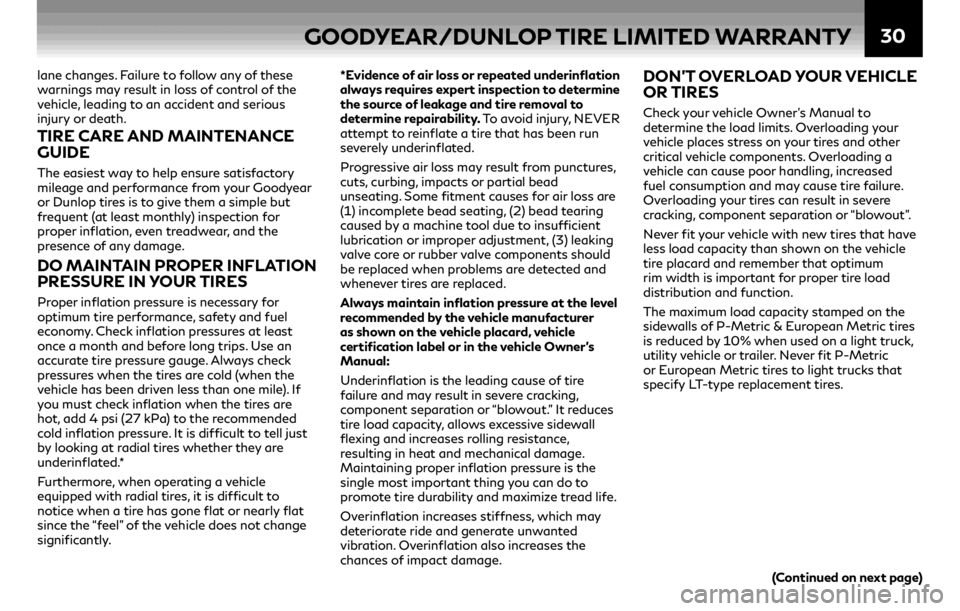
30
lane changes. Failure to follow any of these
warnings may result in loss of control of the
vehicle, leading to an accident and serious
injury or death.
TIRE CARE AND MAINTENANCE
GUIDE
The easiest way to help ensure satisfactory
mileage and performance from your Goodyear
or Dunlop tires is to give them a simple but
frequent (at least monthly) inspection for
proper inflation, even treadwear, and the
presence of any damage.
DO MAINTAIN PROPER INFLATION
PRESSURE IN YOUR TIRES
Proper inflation pressure is necessary for
optimum tire performance, safety and fuel
economy. Check inflation pressures at least
once a month and before long trips. Use an
accurate tire pressure gauge. Always check
pressures when the tires are cold (when the
vehicle has been driven less than one mile). If
you must check inflation when the tires are
hot, add 4 psi (27 kPa) to the recommended
cold inflation pressure. It is difficult to tell just
by looking at radial tires whether they are
underinflated.*
Furthermore, when operating a vehicle
equipped with radial tires, it is difficult to
notice when a tire has gone flat or nearly flat
since the “feel” of the vehicle does not change
significantly.*Evidence of air loss or repeated underinflation
always requires expert inspection to determine
the source of leakage and tire removal to
determine repairability. To avoid injury, NEVER
attempt to reinflate a tire that has been run
severely underinflated.
Progressive air loss may result from punctures,
cuts, curbing, impacts or partial bead
unseating. Some fitment causes for air loss are
(1) incomplete bead seating, (2) bead tearing
caused by a machine tool due to insufficient
lubrication or improper adjustment, (3) leaking
valve core or rubber valve components should
be replaced when problems are detected and
whenever tires are replaced.
Always maintain inflation pressure at the level
recommended by the vehicle manufacturer
as shown on the vehicle placard, vehicle
certification label or in the vehicle Owner’s
Manual:
Underinflation is the leading cause of tire
failure and may result in severe cracking,
component separation or “blowout.” It reduces
tire load capacity, allows excessive sidewall
flexing and increases rolling resistance,
resulting in heat and mechanical damage.
Maintaining proper inflation pressure is the
single most important thing you can do to
promote tire durability and maximize tread life.
Overinflation increases stiffness, which may
deteriorate ride and generate unwanted
vibration. Overinflation also increases the
chances of impact damage.
DON’T OVERLOAD YOUR VEHICLE
OR TIRES
Check your vehicle Owner’s Manual to
determine the load limits. Overloading your
vehicle places stress on your tires and other
critical vehicle components. Overloading a
vehicle can cause poor handling, increased
fuel consumption and may cause tire failure.
Overloading your tires can result in severe
cracking, component separation or “blowout”.
Never fit your vehicle with new tires that have
less load capacity than shown on the vehicle
tire placard and remember that optimum
rim width is important for proper tire load
distribution and function.
The maximum load capacity stamped on the
sidewalls of P-Metric & European Metric tires
is reduced by 10% when used on a light truck,
utility vehicle or trailer. Never fit P-Metric
or European Metric tires to light trucks that
specify LT-type replacement tires.
(Continued on next page)
GOODYEAR/DUNLOP TIRE LIMITED WARRANTY
Page 34 of 64
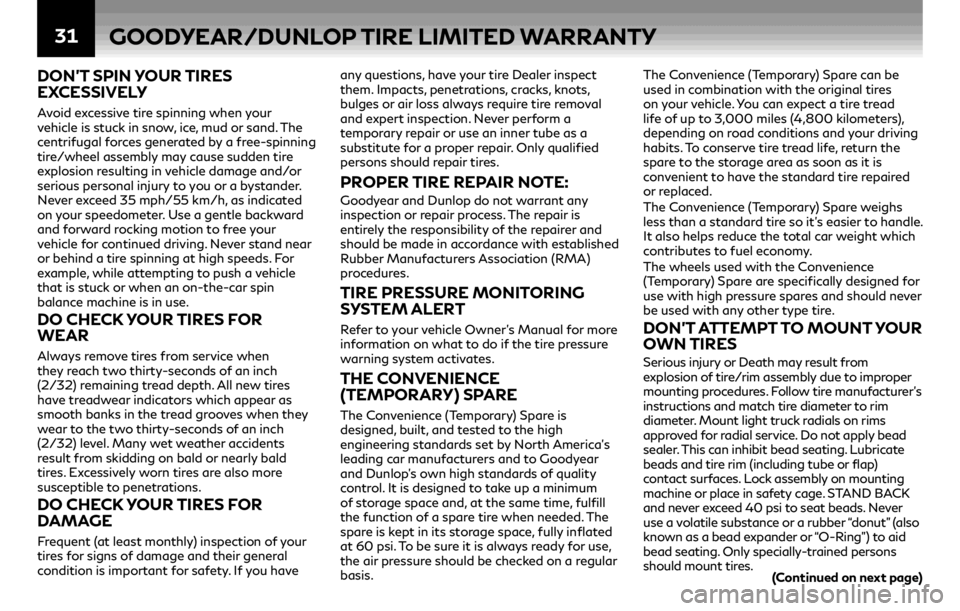
31
DON’T SPIN YOUR TIRES
EXCESSIVELY
Avoid excessive tire spinning when your
vehicle is stuck in snow, ice, mud or sand. The
centrifugal forces generated by a free-spinning
tire/wheel assembly may cause sudden tire
explosion resulting in vehicle damage and/or
serious personal injury to you or a bystander.
Never exceed 35 mph/55 km/h, as indicated
on your speedometer. Use a gentle backward
and forward rocking motion to free your
vehicle for continued driving. Never stand near
or behind a tire spinning at high speeds. For
example, while attempting to push a vehicle
that is stuck or when an on-the-car spin
balance machine is in use.
DO CHECK YOUR TIRES FOR
WEAR
Always remove tires from service when
they reach two thirty-seconds of an inch
(2/32) remaining tread depth. All new tires
have treadwear indicators which appear as
smooth banks in the tread grooves when they
wear to the two thirty-seconds of an inch
(2/32) level. Many wet weather accidents
result from skidding on bald or nearly bald
tires. Excessively worn tires are also more
susceptible to penetrations.
DO CHECK YOUR TIRES FOR
DAMAGE
Frequent (at least monthly) inspection of your
tires for signs of damage and their general
condition is important for safety. If you have any questions, have your tire Dealer inspect
them. Impacts, penetrations, cracks, knots,
bulges or air loss always require tire removal
and expert inspection. Never perform a
temporary repair or use an inner tube as a
substitute for a proper repair. Only qualified
persons should repair tires.
PROPER TIRE REPAIR NOTE:
Goodyear and Dunlop do not warrant any
inspection or repair process. The repair is
entirely the responsibility of the repairer and
should be made in accordance with established
Rubber Manufacturers Association (RMA)
procedures.
TIRE PRESSURE MONITORING
SYSTEM ALERT
Refer to your vehicle Owner’s Manual for more
information on what to do if the tire pressure
warning system activates.
THE CONVENIENCE
(TEMPORARY) SPARE
The Convenience (Temporary) Spare is
designed, built, and tested to the high
engineering standards set by North America’s
leading car manufacturers and to Goodyear
and Dunlop’s own high standards of quality
control. It is designed to take up a minimum
of storage space and, at the same time, fulfill
the function of a spare tire when needed. The
spare is kept in its storage space, fully inflated
at 60 psi. To be sure it is always ready for use,
the air pressure should be checked on a regular
basis. The Convenience (Temporary) Spare can be
used in combination with the original tires
on your vehicle. You can expect a tire tread
life of up to 3,000 miles (4,800 kilometers),
depending on road conditions and your driving
habits. To conserve tire tread life, return the
spare to the storage area as soon as it is
convenient to have the standard tire repaired
or replaced.
The Convenience (Temporary) Spare weighs
less than a standard tire so it’s easier to handle.
It also helps reduce the total car weight which
contributes to fuel economy.
The wheels used with the Convenience
(Temporary) Spare are specifically designed for
use with high pressure spares and should never
be used with any other type tire.
DON’T ATTEMPT TO MOUNT YOUR
OWN TIRES
Serious injury or Death may result from
explosion of tire/rim assembly due to improper
mounting procedures. Follow tire manufacturer’s
instructions and match tire diameter to rim
diameter. Mount light truck radials on rims
approved for radial service. Do not apply bead
sealer. This can inhibit bead seating. Lubricate
beads and tire rim (including tube or flap)
contact surfaces. Lock assembly on mounting
machine or place in safety cage. STAND BACK
and never exceed 40 psi to seat beads. Never
use a volatile substance or a rubber “donut” (also
known as a bead expander or “O-Ring”) to aid
bead seating. Only specially-trained persons
should mount tires.
GOODYEAR/DUNLOP TIRE LIMITED WARRANTY
(Continued on next page)
Page 35 of 64
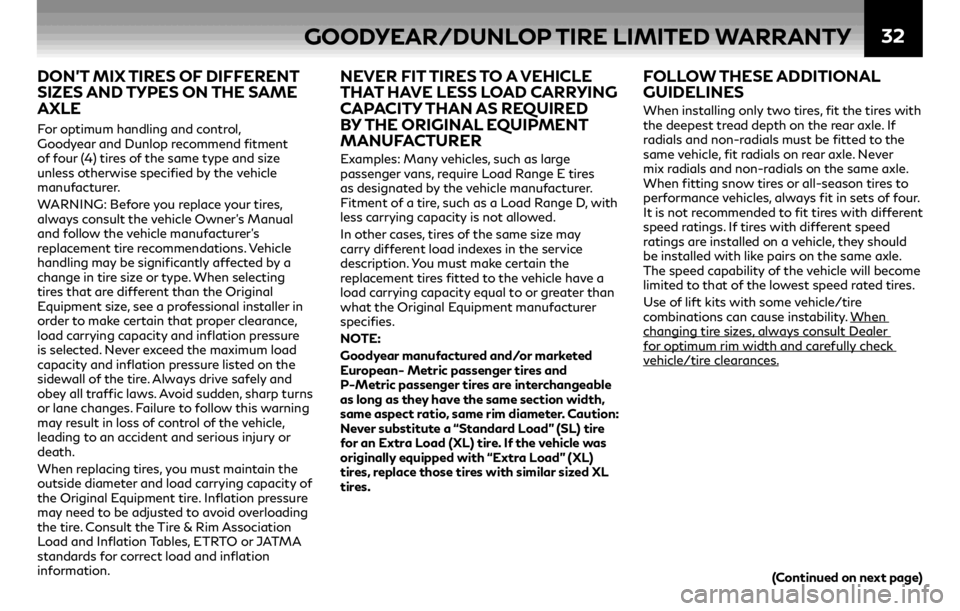
32
DON’T MIX TIRES OF DIFFERENT
SIZES AND TYPES ON THE SAME
AXLE
For optimum handling and control,
Goodyear and Dunlop recommend fitment
of four (4) tires of the same type and size
unless otherwise specified by the vehicle
manufacturer.
WARNING: Before you replace your tires,
always consult the vehicle Owner’s Manual
and follow the vehicle manufacturer’s
replacement tire recommendations. Vehicle
handling may be significantly affected by a
change in tire size or type. When selecting
tires that are different than the Original
Equipment size, see a professional installer in
order to make certain that proper clearance,
load carrying capacity and inflation pressure
is selected. Never exceed the maximum load
capacity and inflation pressure listed on the
sidewall of the tire. Always drive safely and
obey all traffic laws. Avoid sudden, sharp turns
or lane changes. Failure to follow this warning
may result in loss of control of the vehicle,
leading to an accident and serious injury or
death.
When replacing tires, you must maintain the
outside diameter and load carrying capacity of
the Original Equipment tire. Inflation pressure
may need to be adjusted to avoid overloading
the tire. Consult the Tire & Rim Association
Load and Inflation Tables, ETRTO or JATMA
standards for correct load and inflation
information.
NEVER FIT TIRES TO A VEHICLE
THAT HAVE LESS LOAD CARRYING
CAPACITY THAN AS REQUIRED
BY THE ORIGINAL EQUIPMENT
MANUFACTURER
Examples: Many vehicles, such as large
passenger vans, require Load Range E tires
as designated by the vehicle manufacturer.
Fitment of a tire, such as a Load Range D, with
less carrying capacity is not allowed.
In other cases, tires of the same size may
carry different load indexes in the service
description. You must make certain the
replacement tires fitted to the vehicle have a
load carrying capacity equal to or greater than
what the Original Equipment manufacturer
specifies.
NOTE:
Goodyear manufactured and/or marketed
European- Metric passenger tires and
P-Metric passenger tires are interchangeable
as long as they have the same section width,
same aspect ratio, same rim diameter. Caution:
Never substitute a “Standard Load” (SL) tire
for an Extra Load (XL) tire. If the vehicle was
originally equipped with “Extra Load” (XL)
tires, replace those tires with similar sized XL
tires.
FOLLOW THESE ADDITIONAL
GUIDELINES
When installing only two tires, fit the tires with
the deepest tread depth on the rear axle. If
radials and non-radials must be fitted to the
same vehicle, fit radials on rear axle. Never
mix radials and non-radials on the same axle.
When fitting snow tires or all-season tires to
performance vehicles, always fit in sets of four.
It is not recommended to fit tires with different
speed ratings. If tires with different speed
ratings are installed on a vehicle, they should
be installed with like pairs on the same axle.
The speed capability of the vehicle will become
limited to that of the lowest speed rated tires.
Use of lift kits with some vehicle/tire
combinations can cause instability. When
changing tire sizes, always consult Dealer
for optimum rim width and carefully check
vehicle/tire clearances.
GOODYEAR/DUNLOP TIRE LIMITED WARRANTY
(Continued on next page)
Page 36 of 64
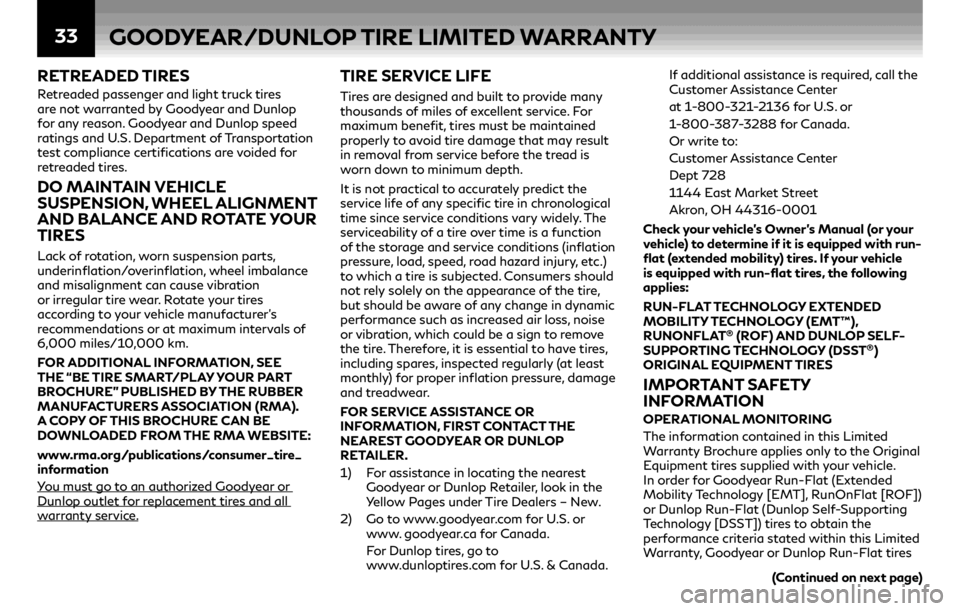
33
RETREADED TIRES
Retreaded passenger and light truck tires
are not warranted by Goodyear and Dunlop
for any reason. Goodyear and Dunlop speed
ratings and U.S. Department of Transportation
test compliance certifications are voided for
retreaded tires.
DO MAINTAIN VEHICLE
SUSPENSION, WHEEL ALIGNMENT
AND BALANCE AND ROTATE YOUR
TIRES
Lack of rotation, worn suspension parts,
underinflation/overinflation, wheel imbalance
and misalignment can cause vibration
or irregular tire wear. Rotate your tires
according to your vehicle manufacturer’s
recommendations or at maximum intervals of
6,000 miles/10,000 km.
FOR ADDITIONAL INFORMATION, SEE
THE “BE TIRE SMART/PLAY YOUR PART
BROCHURE” PUBLISHED BY THE RUBBER
MANUFACTURERS ASSOCIATION (RMA).
A COPY OF THIS BROCHURE CAN BE
DOWNLOADED FROM THE RMA WEBSITE:
www.rma.org/publications/consumer_tire_
information
You must go to an authorized Goodyear or
Dunlop outlet for replacement tires and all
warranty service.
TIRE SERVICE LIFE
Tires are designed and built to provide many
thousands of miles of excellent service. For
maximum benefit, tires must be maintained
properly to avoid tire damage that may result
in removal from service before the tread is
worn down to minimum depth.
It is not practical to accurately predict the
service life of any specific tire in chronological
time since service conditions vary widely. The
serviceability of a tire over time is a function
of the storage and service conditions (inflation
pressure, load, speed, road hazard injury, etc.)
to which a tire is subjected. Consumers should
not rely solely on the appearance of the tire,
but should be aware of any change in dynamic
performance such as increased air loss, noise
or vibration, which could be a sign to remove
the tire. Therefore, it is essential to have tires,
including spares, inspected regularly (at least
monthly) for proper inflation pressure, damage
and treadwear.
FOR SERVICE ASSISTANCE OR
INFORMATION, FIRST CONTACT THE
NEAREST GOODYEAR OR DUNLOP
RETAILER.
1) For assistance in locating the nearest
Goodyear or Dunlop Retailer, look in the
Yellow Pages under Tire Dealers – New.
2) Go to www.goodyear.com for U.S. or
www. goodyear.ca for Canada.
For Dunlop tires, go to
www.dunloptires.com for U.S. & Canada. If additional assistance is required, call the
Customer Assistance Center
at 1-800-321-2136 for U.S. or
1-800-387-3288 for Canada.
Or write to:
Customer Assistance Center
Dept 728
1144 East Market Street
Akron, OH 44316-0001
Check your vehicle’s Owner’s Manual (or your
vehicle) to determine if it is equipped with run-
flat (extended mobility) tires. If your vehicle
is equipped with run-flat tires, the following
applies:
RUN-FLAT TECHNOLOGY EXTENDED
MOBILITY TECHNOLOGY (EMT™),
RUNONFLAT
® (ROF) AND DUNLOP SELF-
SUPPORTING TECHNOLOGY (DSST®)
ORIGINAL EQUIPMENT TIRES
IMPORTANT SAFETY
INFORMATION
OPERATIONAL MONITORING
The information contained in this Limited
Warranty Brochure applies only to the Original
Equipment tires supplied with your vehicle.
In order for Goodyear Run-Flat (Extended
Mobility Technology [EMT], RunOnFlat [ROF])
or Dunlop Run-Flat (Dunlop Self-Supporting
Technology [DSST]) tires to obtain the
performance criteria stated within this Limited
Warranty, Goodyear or Dunlop Run-Flat tires
GOODYEAR/DUNLOP TIRE LIMITED WARRANTY
(Continued on next page)
Page 37 of 64
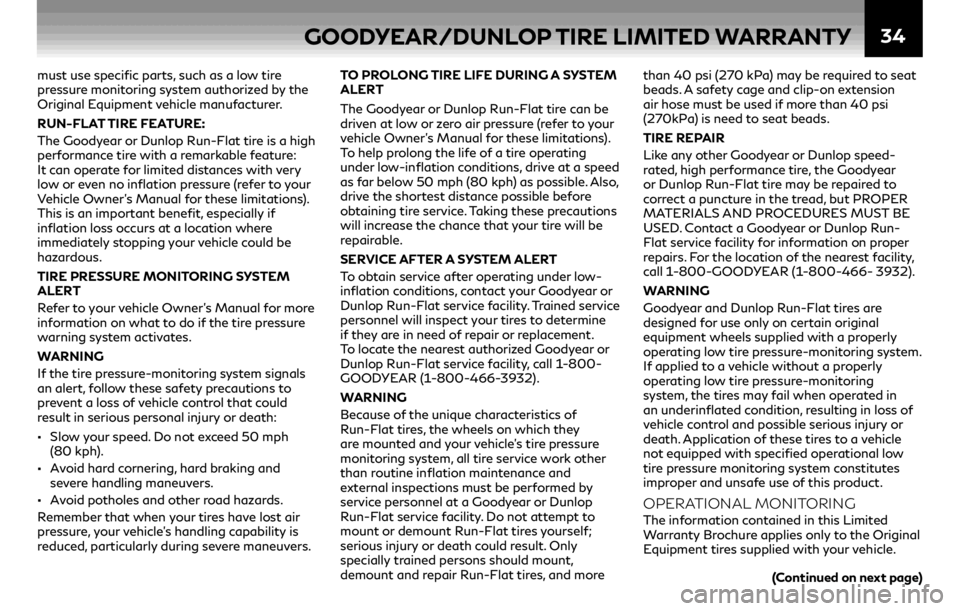
34
must use specific parts, such as a low tire
pressure monitoring system authorized by the
Original Equipment vehicle manufacturer.
RUN-FLAT TIRE FEATURE:
The Goodyear or Dunlop Run-Flat tire is a high
performance tire with a remarkable feature:
It can operate for limited distances with very
low or even no inflation pressure (refer to your
Vehicle Owner’s Manual for these limitations).
This is an important benefit, especially if
inflation loss occurs at a location where
immediately stopping your vehicle could be
hazardous.
TIRE PRESSURE MONITORING SYSTEM
ALERT
Refer to your vehicle Owner’s Manual for more
information on what to do if the tire pressure
warning system activates.
WARNING
If the tire pressure-monitoring system signals
an alert, follow these safety precautions to
prevent a loss of vehicle control that could
result in serious personal injury or death:
•• Slow your speed. Do not exceed 50 mph
(80 kph).
•• Avoid hard cornering, hard braking and
severe handling maneuvers.
•• Avoid potholes and other road hazards.
Remember that when your tires have lost air
pressure, your vehicle’s handling capability is
reduced, particularly during severe maneuvers.TO PROLONG TIRE LIFE DURING A SYSTEM
ALERT
The Goodyear or Dunlop Run-Flat tire can be
driven at low or zero air pressure (refer to your
vehicle Owner’s Manual for these limitations).
To help prolong the life of a tire operating
under low-inflation conditions, drive at a speed
as far below 50 mph (80 kph) as possible. Also,
drive the shortest distance possible before
obtaining tire service. Taking these precautions
will increase the chance that your tire will be
repairable.
SERVICE AFTER A SYSTEM ALERT
To obtain service after operating under low-
inflation conditions, contact your Goodyear or
Dunlop Run-Flat service facility. Trained service
personnel will inspect your tires to determine
if they are in need of repair or replacement.
To locate the nearest authorized Goodyear or
Dunlop Run-Flat service facility, call 1-800-
GOODYEAR (1-800-466-3932).
WARNING
Because of the unique characteristics of
Run-Flat tires, the wheels on which they
are mounted and your vehicle’s tire pressure
monitoring system, all tire service work other
than routine inflation maintenance and
external inspections must be performed by
service personnel at a Goodyear or Dunlop
Run-Flat service facility. Do not attempt to
mount or demount Run-Flat tires yourself;
serious injury or death could result. Only
specially trained persons should mount,
demount and repair Run-Flat tires, and more than 40 psi (270 kPa) may be required to seat
beads. A safety cage and clip-on extension
air hose must be used if more than 40 psi
(270kPa) is need to seat beads.
TIRE REPAIR
Like any other Goodyear or Dunlop speed-
rated, high performance tire, the Goodyear
or Dunlop Run-Flat tire may be repaired to
correct a puncture in the tread, but PROPER
MATERIALS AND PROCEDURES MUST BE
USED. Contact a Goodyear or Dunlop Run-
Flat service facility for information on proper
repairs. For the location of the nearest facility,
call 1-800-GOODYEAR (1-800-466- 3932).
WARNING
Goodyear and Dunlop Run-Flat tires are
designed for use only on certain original
equipment wheels supplied with a properly
operating low tire pressure-monitoring system.
If applied to a vehicle without a properly
operating low tire pressure-monitoring
system, the tires may fail when operated in
an underinflated condition, resulting in loss of
vehicle control and possible serious injury or
death. Application of these tires to a vehicle
not equipped with specified operational low
tire pressure monitoring system constitutes
improper and unsafe use of this product.OPERATIONAL MONITORING The information contained in this Limited
Warranty Brochure applies only to the Original
Equipment tires supplied with your vehicle.
GOODYEAR/DUNLOP TIRE LIMITED WARRANTY
(Continued on next page)
Page 38 of 64
![INFINITI Q50 2020 Warranty Information Booklet 35
In order for Goodyear Run-Flat (Extended
Mobility Technology [EMT], RunOnFlat [ROF])
or Dunlop Run-Flat (Dunlop Self- Supporting
Technology [DSST]) tires to obtain the
performance criteria stat INFINITI Q50 2020 Warranty Information Booklet 35
In order for Goodyear Run-Flat (Extended
Mobility Technology [EMT], RunOnFlat [ROF])
or Dunlop Run-Flat (Dunlop Self- Supporting
Technology [DSST]) tires to obtain the
performance criteria stat](/img/42/35004/w960_35004-37.png)
35
In order for Goodyear Run-Flat (Extended
Mobility Technology [EMT], RunOnFlat [ROF])
or Dunlop Run-Flat (Dunlop Self- Supporting
Technology [DSST]) tires to obtain the
performance criteria stated within this Limited
Warranty, Goodyear or Dunlop Run- Flat tires
must use specific parts, such as a low tire
pressure monitoring system authorized by the
Original Equipment vehicle manufacturer.
RUN-FLAT TIRE FEATURE:The Goodyear or Dunlop Run-Flat tire is a high
performance tire with a remarkable feature:
It can operate for limited distances with very
low or even no inflation pressure (refer to your
Vehicle Owner’s Manual for these limitations).
This is an important benefit, especially if
inflation loss occurs at a location where
immediately stopping your vehicle could be
hazardous.
TIRE PRESSURE MONITORING
SYSTEM ALERT
Refer to your vehicle Owner’s Manual for more
information on what to do if the tire pressure
warning system activates.
WARNING
If the tire pressure-monitoring system signals
an alert, follow these safety precautions to
prevent a loss of vehicle control that could
result in serious personal injury or death:
•• Slow your speed. Do not exceed 50 mph
(80 kph).
•• Avoid hard cornering, hard braking and
severe handling maneuvers.
•• Avoid potholes and other road hazards.
Remember that when your tires have lost air
pressure, your vehicle’s handling capability is
reduced, particularly during severe maneuvers.
TO PROLONG TIRE LIFE DURING A
SYSTEM ALERT
The Goodyear or Dunlop Run-Flat tire can be
driven at low or zero air pressure (refer to your
vehicle Owner’s Manual for these limitations).
To help prolong the life of a tire operating
under low-inflation conditions, drive at a speed
as far below 50 mph (80 kph) as possible. Also,
drive the shortest distance possible before
obtaining tire service. Taking these precautions
will increase the chance that your tire will be
repairable.
SERVICE AFTER A SYSTEM ALERT To obtain service after operating under low-
inflation conditions, contact your Goodyear or
Dunlop Run-Flat service facility. Trained service
personnel will inspect your tires to determine
if they are in need of repair or replacement.
To locate the nearest authorized Goodyear or
Dunlop Run-Flat service facility, call 1-800-
GOODYEAR (1-800-466-3932).
WARNING
Because of the unique characteristics of
Run-Flat tires, the wheels on which they
are mounted and your vehicle’s tire pressure
monitoring system, all tire service work other
than routine inflation maintenance and
external inspections must be performed by
service personnel at a Goodyear or Dunlop Run-Flat service facility. Do not attempt to
mount or demount Run-Flat tires yourself;
serious injury or death could result. Only
specially trained persons should mount,
demount and repair Run-Flat tires, and more
than 40 psi (270 kPa) may be required to seat
beads. A safety cage and clip-on extension
air hose must be used if more than 40 psi
(270kPa) is needed to seat beads.
TIRE REPAIR Like any other Goodyear or Dunlop speed-
rated, high performance tire, the Goodyear
or Dunlop Run-Flat tire may be repaired to
correct a puncture in the tread, but PROPER
MATERIALS AND PROCEDURES MUST BE
USED. Contact a Goodyear or Dunlop Run-
Flat service facility for information on proper
repairs. For the location of the nearest facility,
call 1-800-GOODYEAR (1-800-466-3932).
WARNING
Goodyear and Dunlop Run-Flat tires are
designed for use only on certain original
equipment wheels supplied with a properly
operating low tire pressure-monitoring system.
If applied to a vehicle without a properly
operating low tire pressure-monitoring
system, the tires may fail when operated in
an underinflated condition, resulting in loss of
vehicle control and possible serious injury or
death. Application of these tires to a vehicle
not equipped with specified operational low
tire pressure monitoring system constitutes
improper and unsafe use of this product.
GOODYEAR/DUNLOP TIRE LIMITED WARRANTY
Page 39 of 64

36
WHO IS COVERED
The original owner of a Michelin Passenger or
Light Truck tire which bears the Michelin name
and complete DOT identification number.
WHAT IS COVERED AND FOR HOW
LONG
Michelin Passenger and Light Truck tires, used
in normal service on the vehicle on which they
were originally fitted and in accordance with
the maintenance recommendations and safety
warnings contained in the Owner’s Manual
and in the Important Tire Safety Information
Section of this booklet, are covered by this
warranty against defects in workmanship
and material for the life of the original usable
tread, or 6 years from the date of purchase,
whichever comes first. At that time, all
warranties, express or implied, are terminated.
The usable tread is the original tread down
to the level of the tread wear indicators
- 2/32nds of an inch (1.6mm) of tread
remaining. Date of purchase is documented by
new vehicle registration or tire sales invoice. If
no proof of purchase, coverage will be based
on date of manufacture.
WHAT IS NOT COVERED
Tires which become unserviceable due to:
•• Road hazard injury (e.g., a cut, snag,
bruise, impact damage, puncture, whether
repairable or not);
•• Incorrect mounting of the tire, tire/wheel
imbalance, or improper repair;
•• Underinflation, overinflation, improper
maintenance or other abuse;
•• Mechanical irregularity in the vehicle such as
wheel misalignment resulting in uneven or
rapid wear;
•• Accident, fire, chemical corrosion, tire
alteration, or vandalism;
•• Ozone or weather cracking.
WHAT MICHELIN WILL DO
PASSENGER AND LIGHT
TRUCK TIRES A tire which becomes unserviceable due to
a condition covered by this warranty will be
replaced with a comparable new Michelin
tire, free of charge, when 2/32nds of an inch
(1.6mm) or less of the original tread is worn,
(or 25% or less, whichever is most beneficial to
the user) and within 12 months of the date of
purchase. Mounting and balancing of tires is
included. The cost of any other service charges
or applicable taxes are payable by the user.
When more than 2/32nds of an inch of
original tread has been worn (or more than
25%, whichever is most beneficial to the user)
or after 12 months from date of purchase, the
user must pay the cost of a comparable new
Michelin passenger or light truck replacement
tire on a pro-rata basis. The retailer shall
determine the charge by multiplying the
percentage of the original usable tread worn by the current actual selling price at
the adjustment location or the price on the
current Michelin Base Price List, whichever is
lower. This List is based on a predetermined
price intended to fairly represent the actual
selling price of the tire. The cost of mounting,
balancing and any other service charges or
applicable taxes are payable by the user.
WHAT THE CONSUMER MUST DO
When making a claim under the terms of this
warranty, the consumer must present the tire
to an authorized Michelin Retailer. To locate
an Authorized Tire Retailer, check the yellow
pages under “Tire Retailers - Retail.” The vehicle
on which the tire was used should be available
for inspection.
It is essential that you read and understand the
safety and maintenance recommendations (see
Safety Maintenance Information) for your tires.
CONDITIONS AND EXCLUSIONS
THIS WARRANTY DOES NOT PROVIDE
COMPENSATION FOR LOSS OF TIME, LOSS
OF USE OF VEHICLE, INCONVENIENCE
OR CONSEQUENTIAL DAMAGE. TIRES
PRESENTED FOR CLAIM REMAIN THE
PROPERTY OF THE CONSUMER AND
MICHELIN ACCEPTS NO RESPONSIBILITY
FOR LOSS OF, OR DAMAGE TO, TIRES
WHICH ARE IN THE CUSTODY OR
CONTROL OF A MICHELIN TIRE RETAILER
FOR THE PURPOSES OF INSPECTION FOR
MICHELIN PASSENGER AND LIGHT TRUCK TIRE LIMITED WARRANTY
(Continued on next page)
Page 40 of 64

37MICHELIN PASSENGER AND LIGHT TRUCK TIRE LIMITED WARRANTY
WARRANTY ADJUSTMENT. IN THE EVENT
OF A DISPUTED CLAIM, THE CONSUMER
MUST MAKE THE TIRE AVAILABLE FOR
FURTHER INSPECTION.
NO MICHELIN REPRESENTATIVE,
EMPLOYEE OR RETAILER HAS THE
AUTHORITY TO MAKE OR IMPLY ANY
REPRESENTATION, PROMISE OR
AGREEMENT, WHICH IN ANY WAY VARIES
THE TERMS OF THIS WARRANTY.
THIS WARRANTY APPLIES ONLY IN THE
UNITED STATES AND CANADA.
CONSUMER RIGHTS
THIS WARRANTY GIVES YOU SPECIFIC
LEGAL RIGHTS, AND YOU MAY ALSO HAVE
OTHER RIGHTS WHICH VARY FROM STATE
TO STATE AND PROVINCE TO PROVINCE.
SAFETY MAINTENANCE
INFORMATION
Read your vehicle Owner’s Manual, the
information on the sidewall of your tires,
the vehicle tire information placard and the
Important Tire Safety Information section
of this booklet for essential safety and
maintenance information.
THE WARRANTOR
The warrantor of Michelin Tires is Michelin
North America, Inc. 1 Parkway South, P.O. Box
19001, Greenville, South Carolina 29602-
9001. For Client Assistance:
1-800-TIRE HELP (800- 847-3435) - U. S.
1-800-461-8473 - Canada (outside Quebec)
1-800-565-7638 - Canada (Quebec)
DANGER
Disregarding any of the safety precautions
and instructions contained in the Owner’s
Manual or the Important Tire Safety
Information in this booklet may result in tire
failure or explosion causing serious personal
injury or death.